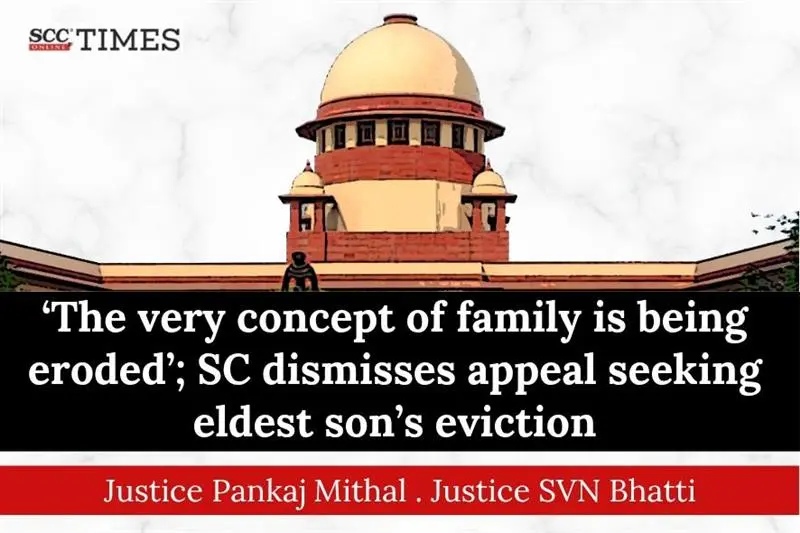Supreme Court: While considering the instant dispute wherein the filed an appeal seeking eviction of her son from the house; the Division Bench of Pankaj Mithal* and SVN Bhatti, JJ., grimly remarked that though Indian society believes in “Vasudhaiva Kutumbakam” i.e. the earth, as a whole, is one family; however, today there is an inability to retain the unity in the immediate family. “The very concept of ‘family’ is being eroded and we are on the brink of one person one family”.
Background:
The appellant and her deceased husband had 3 sons and 2 daughters. The late husband owned a house and 3 shops. The parents’ eldest son who was carrying on the utensil business in the shop which he had taken over from his father. The parents’ second son doing electrical business from the other shop and the 3rd shop was gifted to his younger daughter.
The relations of the parents were not cordial with their sons. Consequently, the deceased father made an application to the SDM alleging mental and physical torture by his eldest son. The parents further initiated proceedings for grant of maintenance against their 2 sons and the Family Court in 2018 awarded total maintenance of Rs 8000 per month to the parents.
Owing to further familial turmoil, the parents initiated proceedings under the Maintenance and Welfare of Parents and Senior Citizens Act, 2007 before the Maintenance Tribunal, Sub-Division Tehsil Sadar District Sultanpur seeking eviction of their eldest son from the house. The Tribunal registered the case and referred the matter to the Conciliation Officer but the conciliation was unsuccessful.
The Tribunal upon taking note of the submissions and evidence on record, directed the eldest son not to encroach upon any part of the house without the permission of his parents except the shop in which he is carrying utensil business and the room with a bathroom occupied by him in which he resides with his wife and children. It was also provided that if he humiliates his parents then eviction proceedings would be initiated against him. The Tribunal further directed the 2 sons to continue paying maintenance to the parents, as directed by the Family Court.
Unsatisfied with the afore-stated decision, the parents preferred appeal before the Appellate Tribunal, District Magistrate Sultanpur, which set aside the Tribunal’s order directed the eviction of the eldest son.
Aggrieved with the Appellate Tribunal’s order, the eldest son approached the Allahabad High Court, which partly allowed the said writ petition by setting aside the order of eviction but maintained the other directions given by the Tribunal.
During the pendency of the above proceedings, the appellant’s husband died and now the litigation is being pursued by his wife since then.
Court’s Assessment:
Perusing the property documents on record, the Court noted that the documents prima facie indicate that the property was purchased by the deceased father in 1971. He had transferred the same partly in favour of his elder daughter and partly in favour of his son-in-law whereas one shop in the ground floor has been gifted to the younger daughter. That apart, institution of the two suits by the eldest son for cancellation of the gift deed/sale deed and the suit for declaration of his 1/6th share in the property indicates that there is a contest between the parents and eldest son as to whether the father could have executed a gift and sale deed as alleged or if the son had 1/6th share therein. So, unless the aforesaid dispute culminates, it cannot be said that the father was the exclusive owner of the property and that the son had no right/share in it.
The Court further pointed out that the deceased father had transferred the house in favour of his two daughters and the two plots, one in favour of his son-in-law and the other to a stranger. He had gifted one shop to the younger daughter. Therefore, ex-facie he ceased to be the owner of the property and it is up to the purchasers to initiate eviction proceedings, if any, against the occupants of any part of it.
The Court explained that that under the Senior Citizens Act, senior citizens are simply entitled to maintenance rather than eviction of their son/relatives that the Tribunal disposed of the matter with the categorical direction that eldest son would continue to occupy and carry on business from the shop in question and at the same time would reside only in a one room portion with attached bathroom without encroaching upon any other part of the house. It was only in the contingency of not behaving properly or continuing to humiliate or torture the parents that the eviction proceedings would be necessary against the eldest son.
The Court noted that there was no complaint or any material on record to indicate that after the Tribunal’s order the eldest son had in any way humiliated his parents especially the appellant or has interfered with her living. Furthermore, there’s no dispute that the sons have been continuing to pay maintenance as directed by the Family Court.
In the aforesaid facts and circumstances the Court found the Tribunal justified in permitting the eldest son to reside in a small portion of the house with a rider of drawing eviction proceedings if the son indulges in any untoward behaviour or interferes with the life of others.
The Court pointed out that the provisions of the Senior Citizens Act, nowhere specifically provides for drawing proceedings for eviction of persons from any premises owned or belonging to such a senior person.
The Court further stated that the Appellate Tribunal did not record any reason necessitating the eviction of the eldest son. The Court thus opined that the Appellate Tribunal was not justified in ordering for his eviction merely for the reason that the property belonged to the deceased father, completely ignoring the fact that the claim of the eldest son regarding 1/6th share and the cancellation of gifts and sale deeds is pending adjudication before the civil court. In the facts and circumstances of the case, there was no necessity for the extreme step for ordering the eviction of the son from a portion of the house rather the purpose could have been served by ordering maintenance as provided under Section 4/5 of the Senior Citizens Act and by restraining him from harassing the parents and interfering in their day-to-day life.
Therefore, the High Court was within its jurisdiction to set aside the eviction order passed by the Appellate Tribunal. Hence, the Court dismissed the instant appeal.
CASE DETAILS
|
Citation: Appellants : Respondents : |
Advocates who appeared in this case For Petitioner(s): For Respondent(s): |
CORAM :









Staying away from the aged Parents and visiting their house on regular basis is the only solution .